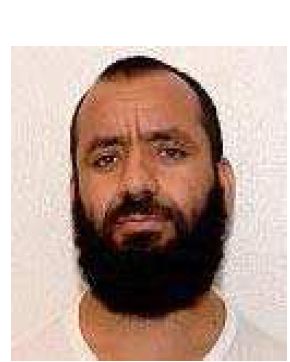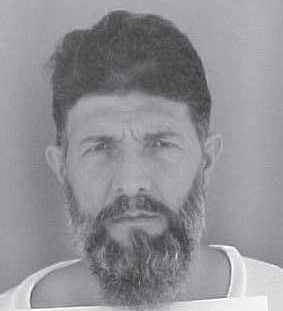Related Research Articles
Muhammad Ismail Agha is an Afghan national who was among some 15-21 juveniles held at the Guantanamo Bay detention camps. He is believed to be 13 or 14 years old when arrested by Afghan soldiers. Detained without charge, he was released on January 29, 2004, and returned home.

In 2005, The New York Times obtained a 2,000-page United States Army investigatory report concerning the homicides of two unarmed civilian Afghan prisoners by U.S. military personnel in December 2002 at the Bagram Theater Internment Facility in Bagram, Afghanistan and general treatment of prisoners. The two prisoners, Habibullah and Dilawar, were repeatedly chained to the ceiling and beaten, resulting in their deaths. Military coroners ruled that both the prisoners' deaths were homicides. Autopsies revealed severe trauma to both prisoners' legs, describing the trauma as comparable to being run over by a bus. Seven soldiers were charged in 2005.

Dilawar, also known as Dilawar of Yakubi, was an Afghan farmer and taxi driver who was tortured to death by US Army soldiers at the Bagram Collection Point, a US military detention center in Afghanistan.
Richard Dean Belmar is a British man who was held in extrajudicial detention in the Guantanamo Bay detention camp. He was first detained in Pakistan in 2002 and sent to Bagram Theater Internment Facility, then Guantanamo. He was not charged, and was returned to the United Kingdom on 25 January 2005.
Saad Madi Saad al Azmi is a Kuwaiti citizen. He was held in extrajudicial detention in the United States Guantánamo Bay detainment camps, in Cuba, and later repatriated on November 4, 2005. Joint Task Force Guantanamo counter-terrorism analysts report that al-Azmi was born on May 29, 1979, in Doha, Kuwait.

Maasoum Abdah Mouhammad, a citizen of Syria, was formerly held in extrajudicial detention in the U.S. Guantanamo Bay detention camps, in Cuba.

Khalid Mahomoud Abdul Wahab Al Asmr is a citizen of Jordan who was held in extrajudicial detention in the United States Guantanamo Bay detainment camps, in Cuba.
Lufti Bin Swei Lagha is a citizen of Tunisia who was held in extrajudicial detention in the United States's Guantanamo Bay detention camps, in Cuba. The Department of Defense reports that he was born on November 28, 1968, in Tunis, Tunisia.
Khaled Ben Mustafa is a citizen of France who was held in extrajudicial detention in the United States Guantanamo Bay detainment camps, in Cuba. The Department of Defense reports that Mustafa was born on January 9, 1972, in Lyon, France. His Guantanamo Internment Serial Number was 236.

Mohammed Naim Farouq is a citizen of Afghanistan who was held in extrajudicial detention in the United States Guantanamo Bay detention camps, in Cuba. His Guantanamo Internment Serial Number was 633. Mohammed Naim Farouq is named on a "most wanted" poster issued by the Defense Intelligence Agency, and a press release entitled: "Ex-Guantanamo Detainees who have returned to the fight".
The Parwan Detention Facility is Afghanistan's main military prison. Situated next to the Bagram Air Base in the Parwan Province of Afghanistan, the prison was built by the U.S. during the George W. Bush administration. The Parwan Detention Facility, which housed foreign and local combatants, was maintained by the Afghan National Army.
Jawed Ahmad also known as "Jojo" was an Afghan reporter working for Canadian media outlet CTV who was arrested by American troops and declared an enemy combatant, while working with NATO at Kandahar Airport on October 26, 2007.
Kandahar Central Jail, also known as Sarpuza Prison, is a minimum security prison in Kandahar, Afghanistan. It is located next to the Kandahar-Herat Highway in the Sarpuza neighborhood, which is between the neighborhoods of Mirwais Mena and Shahr-e Naw, in the western part of the city. Its current warden is Sayed Akhtar Mohammad Agha Hussaini.
Noor Habib Ullah is a citizen of Afghanistan who was held in extrajudicial detention in the United States's Guantanamo Bay detention camps, in Cuba. Habibullah was one of three former captives who McClatchy Newspapers profiled; he also appeared in a BBC interview which claimed he was abused while interned at Bagram. His Guantanamo Internment Serial Number was 626.
Munir Naseer is a citizen of Pakistan who was held in extrajudicial detention in the United States's Guantanamo Bay detention camps, in Cuba. His Guantanamo Internment Serial Number was 85.
Richard Colvin is a Canadian foreign service officer who gained public attention as a witness in the Canadian Afghan detainee issue. He appeared before the Special Committee on the Canadian Mission in Afghanistan in late 2009, where he testified that Afghan detainees turned over to Afghanistan prisons by Canadian soldiers were tortured. His testimony led to intense scrutiny of the Harper government's detainee policies in Kandahar, including through further witnesses at the House of Commons Afghanistan committee. On January 1, 2010, Prime Minister Harper prorogued Parliament, preventing further testimony on the Afghan detainee issue. This then triggered anti-prorogation protests.
On January 16, 2010, the United States Department of Defense complied with a court order and made public a heavily redacted list of the detainees held in the Bagram Theater Internment Facility. Detainees were initially held in primitive, temporary quarters, in what was originally called the Bagram Collection Point, from late 2001. Detainees were later moved to an indoor detention center until late 2009, when newly constructed facilities were opened.
Contents of the United States diplomatic cables leak depict subjects in the Americas extensively. The leaks, which began on 28 November 2010, occurred when the website of WikiLeaks—an international new media non-profit organisation that publishes submissions of otherwise unavailable documents from anonymous news sources and news leaks—started to publish classified documents of detailed correspondence — diplomatic cables — between the United States Department of State and its diplomatic missions around the world. Since the initial release date, WikiLeaks released further documents every day.
The Guantánamo Bay files leak began on 24 April 2011, when WikiLeaks, along with The New York Times, NPR and The Guardian and other independent news organizations, began publishing 779 formerly secret documents relating to detainees at the United States' Guantánamo Bay detention camp established in 2002 after its invasion of Afghanistan in 2001. The documents consist of classified assessments, interviews, and internal memos about detainees, which were written by the Pentagon's Joint Task Force Guantanamo, headquartered at Guantanamo Bay Naval Base. The documents are marked "secret" and NOFORN.
Ghairat Baheer is a citizen of Afghanistan who served as a Senator in the House of Elders of Afghanistan. He is also the Chairman of the Political Committee of Hezbi Islami in Afghanistan. Ghairat Baheer was held by American forces in extrajudicial detention for over six years. The BBC News reported Pakistani officials took him into custody during a pre-dawn raid on his home in Islamabad on October 30, 2002. The BBC said no reason was offered for his apprehension, and that there were rumors US security officials participated in the raid.
References
- 1 2 3 4 "WikiLeaks uncovers Canadian detainee mystery". CBC News. 2011-09-26. Archived from the original on 2011-09-27. Retrieved 2011-09-27.
- ↑ "U.S. diplomatic cable posted by WikiLeaks (March 4, 2007)". Cablegatesearch. 2011-09-01. Archived from the original on 2011-09-29. Retrieved 2011-09-01.
- 1 2 3 "U.S. diplomatic cable posted by WikiLeaks (Oct. 23, 2007)". Cablegatesearch. 2011-09-01. Archived from the original on 2011-09-29. Retrieved 2011-09-01.
- ↑ "Mentally ill detainee's location unclear". United Press International. 2011-09-26. Archived from the original on 2011-09-27. Retrieved 2011-09-27.
The Canadian news network said Monday U.S. diplomatic cables released by WikiLeaks revealed Khaled Samy Abdallah Ismail was taken into custody in April 2006 and held at the Bagram Theater Internment Facility, where he was diagnosed with paranoid schizophrenia, until at least October 2007. He was often segregated from other detainees despite "largely circumstantial" evidence against him, the CBC said the documents indicate.
- 1 2 3 Amber Hildebrandt (2011-09-27). "Detained Canadian a 'casualty of war on terror': Questions raised about delay in consular help Posted: Sep 27, 2011 5:18 AM ET". CBC News. Archived from the original on 2011-09-27.
Human rights experts want to know why a mentally ill Canadian citizen sat in a secretive U.S. detention facility in Afghanistan for eight months without a consular visit, and more than 18 months behind bars in total. It's unknown whether the delay was due to U.S. officials belatedly informing Canada to the presence of the dual Canadian-Egyptian citizen at the Bagram Theatre Internment Facility or another reason.
- ↑ "Wikileaks reveals mentally ill Canadian held in Afghan jail: Egyptian-born engineer arrested in Kandahar, held for over 18 months". Macleans magazine. 2011-09-26. Retrieved 2011-09-26.